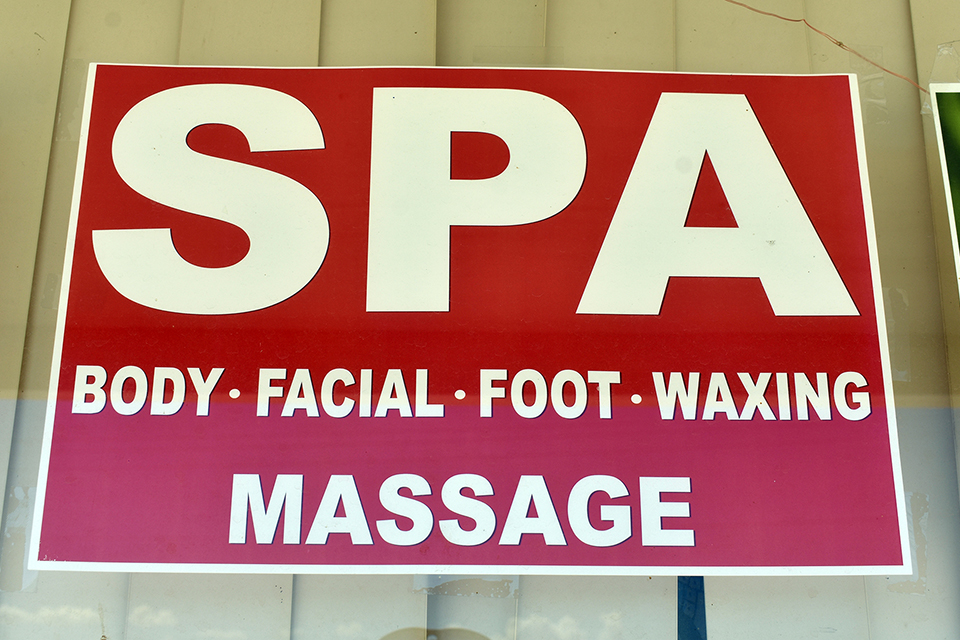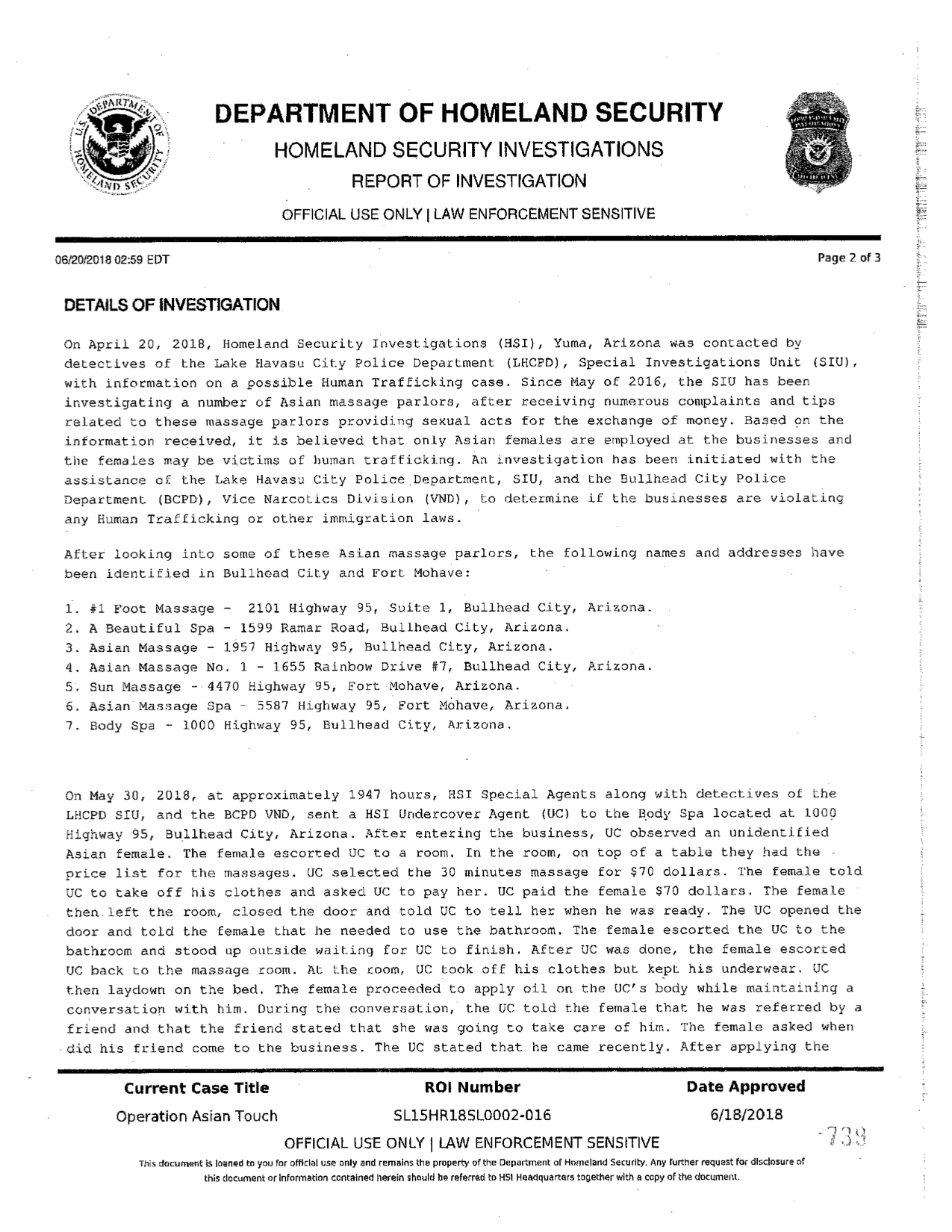

Mike Wozniak pressed play on one of the dozens of hours of HSI undercover audio recordings from an investigation agents had dubbed Operation Asian Touch. The veteran defense attorney, who specializes in criminal and family law, said he had heard such recordings before.
“I distinctly recall sitting in my office. It was late in the day,” said Wozniak, who briefly represented one of the alleged traffickers charged in the investigation. He said he “heard what I would have expected to hear, which is a conversation about services in exchange for money.”
But then he heard something else.
“They talked about a handjob, and I believe I was hearing one take place,” Wozniak said. “In every other case I’ve ever had, the undercover officer did not go through with the actual sexual act.”
Incredulous, Wozniak said he called the lead prosecutor, who confirmed “what I believed I was hearing.”
“I found it pretty repugnant that they were engaged in sexual acts with people that, under their theory, would have been the victims,” he said.
During the investigation, two undercover agents, identified in court records only as “Sergio” and “Arturo,” visited eight massage parlors in Havasu and Bullhead City “and paid the women for sex acts,” according to Mohave County Superior Court and HSI records.
The federal agents visited the massage parlors on 18 occasions, and on 17 visits paid for and engaged in sexual activity, agency and police records showed. Atop each official HSI report signed by supervisors, the agents noted that “the females may be victims of human trafficking.”
One HSI report from May 30, 2018, for example, detailed the agent’s sexual interactions while undercover.
In a dimly lit massage room around 8 p.m., a naked HSI agent covered in massage oil negotiated the price of oral sex with a female worker identified only as “Angel.”
The undercover agent said “he was referred by a friend and that the friend stated she was going to take care of him.” The undercover agent heard that the woman had given his friend oral sex.
From there the negotiations began.

An HSI undercover agent’s visit to a massage parlor in Bullhead City on May 30, 2018, is described in detail in an internal agency report. The narrative describes one of 17 sexual acts HSI undercover agents paid for and engaged in during their “Operation Asian Touch.” (Source: HSI investigative reports obtained by the Howard Center)
The woman said a handjob would cost $60. “How much for oral copulation?” the agent said he asked.
She replied: $120 for oral sex. The agent said he didn’t have enough money, so the woman lowered her price to $100. The agent then “asked her to take off her clothes.” The woman countered again with a price of $120 for oral sex and nudity, and the deal was set.
The woman put a condom on the agent and “attempted to perform oral sex,” the agent reported. He stopped her immediately, he said, pulled off the condom and told her to masturbate him instead.
“The female then placed oil on her hands,” the HSI report said, adding, “After a few minutes, the female stopped and gave the UC a wet towel to clean himself.”
He and the woman later exchanged phone numbers. She told the agent to call her directly next time, “since the owner moves the girls to different ‘shops’ all the time.”
Rideout, who initially represented Yamauchi and later another suspect in the case, said he was shocked when he first read the HSI reports.
“It was absolutely, morally problematic,” he told the Howard Center. “It takes a special officer to be on undercover stuff. It takes an even more special officer to break the law, (to) be willing to have a moral flexibility to have sex with the person you identified as a victim.”
In September 2019, Rideout filed a court motion seeking the names and badge numbers of the HSI undercover agents. Noting they were part of an agency created to protect the nation from terrorist attacks, he said, “It is unclear how an ICE officer having sexual relations with human-trafficking victims in Mohave County, Arizona, protects the nation from terrorist attack or secures the borders.”
Rideout argued the agents should be called to testify, and other defense attorneys agreed.
One of the Mohave County prosecutors assigned to the case, Kellen Marlow, argued against releasing the agents’ identities, saying that exceeded the scope of evidence the state was obligated to disclose. He also said his office had asked HSI for help in the prosecution, but added, “There will be no cooperation from federal partners in prosecuting the crimes they helped investigate.”
By December, all pending felony charges were dismissed. Just before the holidays, a local newspaper, Today’s News-Herald, reported what happened, along with select, leaked HSI records.
“Having sex with people they identify as victims is a crime in itself,” Rideout said, “and they’re not going to come on the stand and testify.”
Defense attorney Brad Rideout meets with reporters at the Howard Center for Investigative Journalism to discuss the Mohave County sex-trafficking case. Rideout represented two of the suspects before charges were dropped. (Video credit: Molly Duerig, Mythili Gubbi/Howard Center)
Josephine Hallam, who later took over Yamauchi’s representation, asked, “How is that possible, ethically, as an attorney that you’re prosecuting a case where there’s such horrendous, unethical, illegal behavior by the officers investigating it?”
Ultimately, of the nine people charged, only three pleaded guilty: one to felony attempted pandering, one to misdemeanor prostitution, and one to misdemeanor solicitation.
Roe-Sepowitz, who serves on the Arizona Human Trafficking Council, called the case a “terrible demonstration of our behavior as a country.”
“Their job is to collect evidence and testify about it in court,” she said, referring to HSI agents. “They don’t actually have any other function. Their whole job was to testify and close that case. They are not fulfilling their duties.”